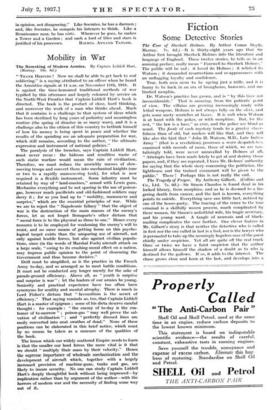Mobility in War
The Remaking of Modern Armies. By Captain Liddell Hart. (Murray. 10s. 6EL) " THANK Heavens ! Now we shall be able to get back to real soldiering," is a saying attributed to an officer when he heard the Armistice signals at 11 a.m. on November 11th, 1918. It is against the time-honoured traditional methods of war typified by this utterance and largely coloured by service on the North-West Frontier that Captain Liddell Hart's book is directed. The book is the product of close, hard thinking, and moreover the work of a man who thinks ahead. Much that it contains is a challenge to that system of ideas which has been sterilized by long years of pedantry and meaningless routine (the spring of disaster in so many wars), and it is a challenge also to the citizen of this country to bethink himself of how his money is being spent in peace and whether the results of the spending are an adequate preparation for war, which still remains, according to the author, " the ultimate expression and instrument of national policies."
The paralysis of the trenches, says Captain Liddell Hart, must never recur : the hideous and resultless waste of such static warfare would mean the ruin of civilization. Therefore, we must reduce the unwieldy masses of slow- moving troops and convert them into mechanical knights (one or two to a rapidly manoeuvring tank), for what is now required is a flexible instrument. Some infantry must be retained by way of " land-marines," armed with Lewis guns. Mechanize everything and be not sparing in the use of poison- gas, however much pacificists and old-fashioned soldiers may decry it ; for so you lead up to " mobility, manoeuvre and surprise," which are the essential principles of war. While we are to reject the " Napoleonic fallacy " that the object of war is the destruction of the main masses of the enemy's forces, let us not forget Bonaparte's other dictum that " moral force is to the physical as three to one." Hence every resource is to be employed for weakening the enemy's will to resist, and no surer means of getting home on this psycho- logical target exists than the unsparing use of aircraft, not only against hostile forces, but also against civilian popula- tions, since (in the words of Marshal Foch) aircraft attack on a large scale, " owing to its crushing moral effect on a nation, may impress public opinion to the point of disarming the Government and thus become decisive."
Drill must be simplified, as is the practice in the French Army to-clay, and so arranged as to meet battle conditions. It must not be conducted any longer merely for the sake of parade-ground efficiency. Above all, as " youth is surprise and surprise is war" : let the leaders of our armies be young. Seniority and practical experience have too often been synonyms for senility and mental atrophy. There is much in Lord Fisher's dictum that " favouritism is the secret of efficiency." That saying reminds us, too, that Captain Liddell Hart is a master of epigram ; some of his dicta deserve careful thought : for example : " the enemy of to-day is the cus- tomer of to-morrow " ; poison-gas " may well prove the sal- vation of civilization " ; and " perfectly dressed lines are easily converted into neat swathes of dead." None of these positions can be elaborated in this brief notice, which must by no means be taken as a measure of the qualities of the book.
The lesson which our widely scattered Empire needs to learn is that the smaller our land forces the more vital is it that we should " multiply their mass by their velocity." Hence the supreme importance of wholesale mechanization and the development of aircraft which, together with a largely increased provision of machine-guns, tanks and gas, are likely to insure security. No one can study Captain Liddell Hart's deeply thoughtful book without being impressed—by implication rather than by argument of the author—with the horrors of modern war and the necessity of finding some way out of it.














































 Previous page
Previous page